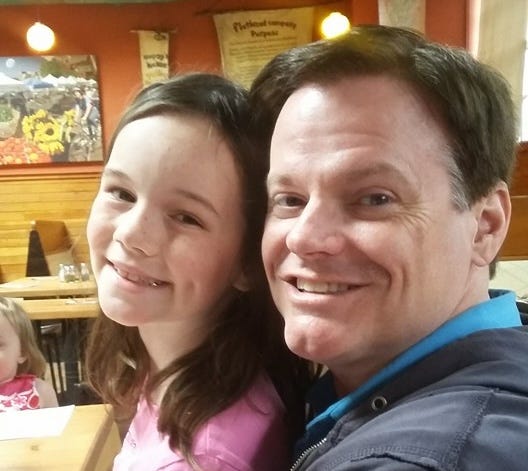Introducing 'apropos of nothing'
Kamala's escort; school cell phone bans; student loan forgiveness
As happened occasionally in my CTNewsJunkie columns, there were so many issues crying out for comment this week that I have decided to channel my late friend Patrick Scully, the former journalist and one-time Democratic political operative in Connecticut and Massachusetts, who authored the popular insiders’ blog, the Hanging Shad.
When Scully had too many issues on his mind and could not settle on one, he would simply title his post “Apropos of nothing.” It was invariably a collection of topics too numerous to cover in-depth in a single column. Scully died in September of 2018, but his memory will live on in this column in the form of an occasional lineup of non-sequiturs:
The finally Kamala interview
So after rebuffing interview request after interview request from multiple media outlets, Democratic presidential nominee Kamala Harris has finally agreed to a question-and-answer session. It is slated for tonight at 9 p.m. on CNN, with Dana Bash asking the questions. Interestingly, sitting beside Harris will be her running mate, Minnesota Gov. Tim Walz.
In its own story announcing the interview, CNN did not say whether including Walz was a condition imposed by the Harris campaign; nor was the subject addressed in a subsequent news analysis posted on CNN.com. That’s sort of a important detail to leave out, but that’s what happens when news organizations cover themselves.
Several commentators have seized on the inclusion of Walz, suggesting Harris needed a political body guard and protector, lest she say something she regrets. The Wall Street Journal editorial board was particularly critical (free link), suggesting Harris’ “handlers are shielding her from tough questions” and that, in including Walz, “she’s bringing along a crutch” and being escorted by a “chaperone.”
It is true that, if the vice president’s handlers are concerned about her ability to handle tough questions, having Walz by her side will limit the amount of time Harris has to speak and therefore reduce her exposure to gaffes. But it’s also true that if Walz outshines her, Harris will not come up smelling like a rose.
And there is this bit of snark from former CBS White House correspondent Mark Knoller, who added that Bash’s first question should be why the Harris campaign insisted on the inclusion of Walz:
But wait — not so fast. It’s not as unusual as one might think to have both members of the national ticket share an interview with journalists:
And we have this on Threads from Casey Seiler, editor of the Albany Times Union, on a statement from Rep. Elise Stefanik, perhaps the most odious of Trump sycophants:
These kinds of attacks, some of them sexist, prompt me to feel sympathy for Harris. Still, I’d argue that hers is a different case. She has not always been adept during past interviews. She sometimes bristles when asked questions she doesn’t like. She has been known to meander in her responses, repeating the same word in the same sentence — or, as her detractors have labeled it, issuing a “word salad.” To see what they mean, check out this video below from Comedy Central:
For her prickly side, see an interview three years ago with Lester Holt, who asked her why she had not visited the U.S-Mexico: “And I haven’t been to Europe.” Harris appeared ill-prepared for that interview. You can bet she won’t be tonight. The CNN sit-down will begin at 9 p.m.
Cell phone ban in schools
The school year began in mid-August here in Texas, but it’s only recently started in New England. So this is a good time to revisit a pressing issue. It looks like, in the not-so-distant future, cell phones in public schools will finally be a thing of the past nationwide. And it’s about time. Across the country, momentum is growing to ban the devices during the school day. Regular readers of this column might recall that I wrote in detail about this scourge during the holidays last year:
According to a report in yesterday’s Washington Post (free link), the growing number of states placing tight restrictions on the use of smart phones have framed the issue in terms of the mental health of students.
I think that’s the right approach because, as a 2023 advisory by the surgeon general made clear, excessive social media use by children may lead to a higher risk of poor mental health, including “body dissatisfaction, disordered eating behaviors, social comparison, and low self-esteem, especially among adolescent girls.” Excessive exposure to social media among adolescents has also been linked to increased risk of suicide. And for obvious reasons, these risks get in the way of learning. I might add that the same probably holds true for adults, but I digress.
Also from the Post: “Several states — including Indiana, Louisiana, South Carolina and Florida — have enacted legislation limiting cellphone access during the school year. And governors in at least three other states, including Virginia, have called on schools to restrict or ban the devices.”
In my home state of Connecticut, the state Board of Education has issued guidelines to schools that stop just short of calling for an outright ban. Evidently, some parents are objecting on the grounds that they won’t be able to communicate with their kiddos during the day. If you need to talk to your child and it absolutely can’t wait until the end of the school day, do what my parents did: call the office and have someone take me out of class.
Teachers seems to be almost uniformly behind these proposals. A recently released poll of teachers by Connecticut’s largest teachers’ union found that 90% of teachers surveyed said they supported policies that “prohibit student use of cellphones during instructional time.” Nearly 77% said they would support extending phone restrictions to the entire school day. The presence of the devices and the need to police them adds to the stress of the day, teachers said.
Student loans
Yesterday, the Supreme Court rejected President Biden’s latest attempt to save what’s left of his attempt to provide debt relief of tens and perhaps hundreds of billions of dollars to Americans with student-loan debt. For the full back-story, see yesterday’s piece in the SCOTUSblog.
Last year the high court rejected by a margin of 6-3 a more expensive proposal that would have forgiven $400 billion in loans. Several state attorneys-general had sued to block Biden’s plan, mostly on constitutional grounds. I agree with them. Actions of this magnitude should be approved by Congress or, as Reuter’s put it:
The conservative justices invoked the "major questions" doctrine, a judicial approach that gives judges broad discretion to invalidate executive agency actions of "vast economic and political significance" unless Congress clearly authorized them in legislation.
Yes, the SCOTUS is very much a right-wing court but sometimes they get it right. I do have empathy for those who are in debt. I also borrowed money to complete my undergraduate degree but it was a fraction of what kids have to borrow now — even when adjusted for inflation.
Speaking of inflation, why have college costs risen at a pace far greater than inflation for the last 40 years? Maybe Biden should use his executive powers to find out. Or Congress could investigate it. I have a hunch, and it’s based on simple market economics. As student loans became easier to get, demand for higher education rose. Why did colleges raise their tuitions at such a rate? Because they could.











Terry, we can agree on "student phones" & loan forgiveness. Our generation paid our way and serviced. Thnaks
Trump makes himself available to news media all the time. And he shows himself for who he really is -- a racist. You saw the Association of Black Journalists interview earlier this month? There is no hue and cry for Trump to be interviewed because he does it all the time in different formats.